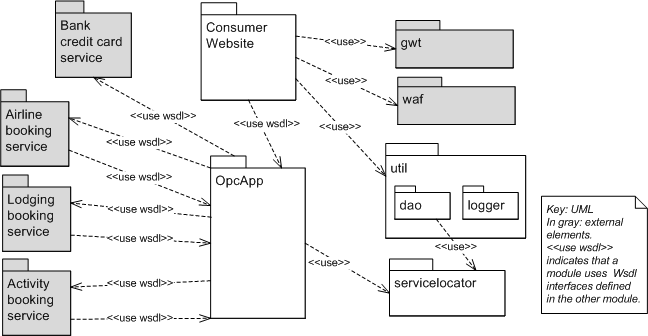
| Include Page | ||||
|---|---|---|---|---|
|
Contents
| Anchor | ||||
|---|---|---|---|---|
|
| Anchor | ||||
|---|---|---|---|---|
|
Consumer Website
The web-based user interface of the Adventure Builder is implemented in this module. The user interface lets the user browse the catalog of travel packages, place a new purchase order, and track the status of existing orders. This module creates the purchase orders based on user input and passes them to OpcApp for processing. It uses an implementation of the Model View Controller pattern called the Web Application Framework (waf). The model is implemented using Entity beans, the controller is implemented using servlets, and the view is a collection of JSPs and static HTML pages. Part of the client-facing code is implemented using the GWT framework.
...
- Accepting purchase order requests from the ConsumerWebsite for processing by hosting the Purchase Order Web Service
- Provide a mechanism for the Consumer Website to query the current status of a purchase order by hosting the Order Tracking Web Service
- Communicate with external suppliers to process and maintain the status of a purchase order.
- Upon completion of processing a purchase order, send an email to the customer of its success or failure.
...
This module is an implementation of the ServiceLocator design pattern.
gwt
Google Web Toolkit (gwt) is an open source framework for development of rich internet applications based on Ajax.
...
Waf stands for Web Application Framework. It is a Model View Controller framework similar to Struts. It allows you to specify in configuration files the web screens and action that are associated to user clicks on specific elements of the screen. The configuration file has the mapping of screens and actions to Java classes. The framework provides the engine to display the proper screens and invoke the proper actions.
...
This module represents an external service provided by an activity supplier company to book different activities.
| Anchor | ||||
|---|---|---|---|---|
|
N/A
| Anchor | ||||
|---|---|---|---|---|
|
See OPC Module Uses View - Variability Guide.
See Top Level SOA View - Variability Guide.
See Consumer Website Multi-tier View - Variability Guide.
| Anchor | ||||
|---|---|---|---|---|
|
WAF
The WAF framework was chosen because it facilitates the implementation of the Consumer Website code by providing template classes for using the MVC pattern. For a given user operation, the developer implements an action class (controller) and JSP pages that correspond to the user screens (view). The developer also uses configuration files to provide a configurable mapping between actions, action classes, events and screens. The WAF infrastructure can then automatically take http requests and invoke the action classes and JSP screens. WAF also provides support for event-based communication and internationalization.
...
*All performance tests were executed on the same hardware: Pentium M 1.7GHz, 2GB RAM, Win XP Pro SP2
| Anchor | ||||
|---|---|---|---|---|
|
- Refinement of OpcApp showing decomposition: OPC Module Decomposition View
- Refinement of OpcApp showing use dependencies: OPC Module Uses View
